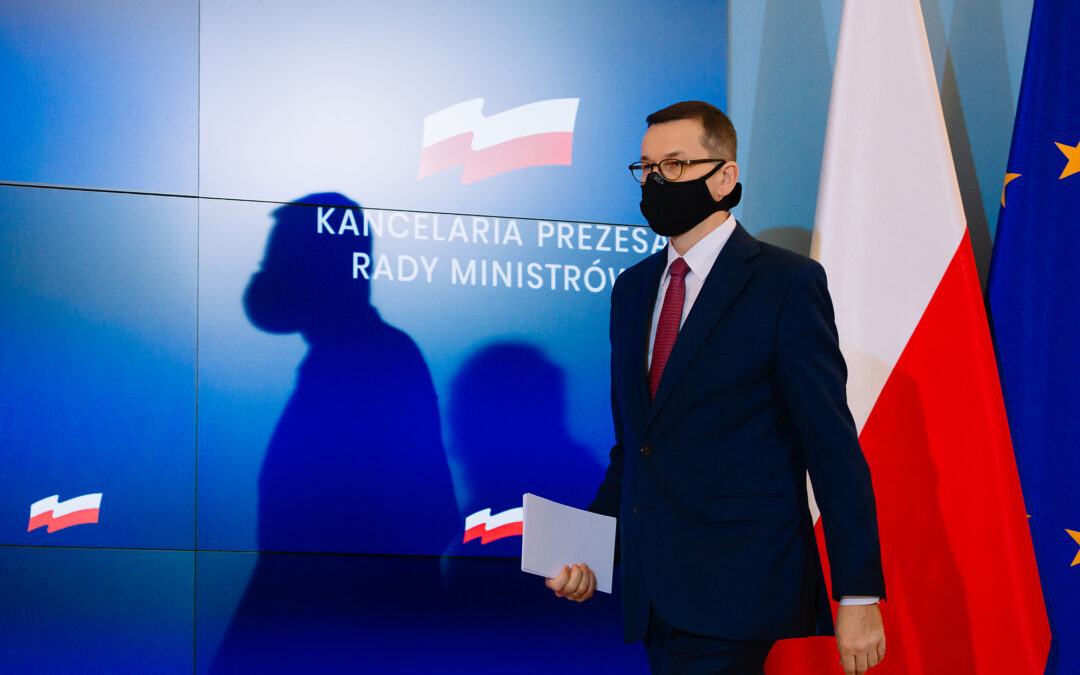Poland’s government has announced details of its plans to roll out COVID-19 vaccines. It promises that the treatment will be available for free and hopes that, although vaccination will remain voluntary, up to 80% of the population will choose to do so.
“We want to provide every citizen with the possibility to vaccinate,” said the health minister, Adam Niedzielski, at a press conference. He called the rollout “one of the biggest logistical operations of recent years”.
“The process will be fairly simple and quick [and] the vaccine will be free and voluntary for everyone,” added the prime minister, Mateusz Morawiecki, speaking alongside Niedzielski.
Although the government is still finalising details of the rollout, Morawiecki explained that the programme will be based on four steps:
- online or traditional registration
- arrival at the vaccination centre and appraisal by a doctor or nurse
- first jab administered
- booster dose given after 21 days
Proces szczepień będzie przebiegał w czterech krokach:
💻 rejestracja online
👩⚕️ zgłoszenie do punktu szczepień
🔎 szczepienie i obserwacja
🔄 powtórzenie procesu (bez rejestracji) pic.twitter.com/FSJWZVJL88— Kancelaria Premiera (@PremierRP) December 2, 2020
A two-shot COVID-19 vaccine is considered to be of the highest efficacy, stressed the prime minister, though he added that one-shot vaccines might also be used later in the process.
Niedzielski said that the first coronavirus vaccine may gain approval for use in Europe on 29 December. In Poland, the first to receive it will be medical personnel, care home staff, members of the uniformed services, and the over-65s, amounting to 6.5 million people in total, informed Morawiecki.
The ultimate goal of the government is to immunise 70-80% of the population. “However, having 50-60% vaccinated will suffice to start developing herd immunity,” Morawiecki added.
Achieving widespread immunity will allow “a return to normality” and will help “protect jobs”, said the prime minister.
Recent polling has suggested, however, that many Poles are reluctant to make use of a COVID-19 vaccine. Just over 50% said they would “definitely” or “probably” not vaccinate themselves, found United Surveys last month.
That follows other international research that has shown Poles to be less likely to use of the vaccine than people in almost any other country studied.
At today’s conference, the prime minister announced that the vaccines are expected to cost between 5 and 10 billion zloty (around €1-2 billion), depending on the final number of doses. “Our budget needs be adjusted to these challenges,” he warned.
Poland has an agreement with three pharmaceutical groups – Pfizer/BioNTech, Johnson&Johnson and AstraZeneca – for the delivery of 45 million doses of the jab after they win approval from European regulators.
On 4 December, a process will begin to designate units in charge of organising vaccination points. The operation will be coordinated between various ministries and the Material Reserves Agency (ARM).
Poland suffered relatively low rates of infections during the first wave of the pandemic. But it has been hit hard by the second, with the number of cases growing exponentially during October. Over the last month, infections has declined significantly following the introduction of restrictions by the government.
Main image credit: Krystian Maj/KPRM (under CC BY-NC-ND 2.0)

Agnieszka Wądołowska is deputy editor-in-chief of Notes from Poland. She is a member of the European Press Prize’s preparatory committee. She was 2022 Fellow at the Entrepreneurial Journalism Creators Program at City University of New York. In 2024, she graduated from the Advanced Leadership Programme for Top Talents at the Center for Leadership. She has previously contributed to Gazeta Wyborcza, Wysokie Obcasy and Duży Format.




















